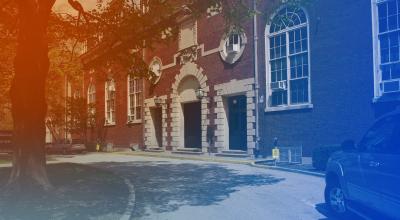
For Husain, the McCristal Lecture is personal
AHS E-News October 2022
Most researchers have an inspiration for their research line. It might be an experience, something they read, or even a TV show or movie. For Fatima Husain, it was more personal.
Dr. Husain, a professor of speech and hearing science, uses a combination of computational modeling, brain imaging experiments, and behavioral experiments to research hearing and speech perception, as well as the disorders associated with them, such as hearing loss and tinnitus.
When she was a Ph.D student at Boston University, Husain said she had a family member who was dealing with a sudden hearing loss.
“I was already thinking about the brain and sounds, and yet I had not come across tinnitus. I remember being in this [ear, nose and throat doctor’s] office and asking questions. ‘And could it be this? Could it be that?’ And you know how some physicians can be, and he said, ‘Why don’t you find out for yourself?”’
So she did.
“I was always trying to find out more about tinnitus,” she said. “I think it took me another five years after that to come to a place where I could start doing research. I started studying in my own time little by little and asking questions. What stood out to me was how little people knew about it. I hope we know more about it now, but still very little is known; compared to even hearing loss, it is very much more challenging and more complicated, which also allows a space for someone like me who is not a clinician, to provide answers and help people.”
That combination of inquisitiveness, persistence and hard work is one of the many reasons Husain is the 2022 recipient of the King J. and Marjorie R. McCristal Distinguished Scholar in the College of Applied Health Sciences, the most prestigious recognition of scholarly achievement given by the college.
Husain joined the Department of Speech and Hearing Science as an assistant professor in 2008. She earned her Ph.D in cognitive and neural systems at BU and joined the National Institute on Deafness and Other Communication Disorders, part of the National Institutes of Health, first as a postdoctoral fellow and then as a research fellow.
At the NIDCD, Husain worked with a researcher who had worked in aging research and was coming to deafness and communication disorders.
“He needed someone who was more interested in sounds than in aging or vision,” she said. “But he kept asking me to be the expert at it. I'm like, ‘What? What do I know?’ But it allowed me to become more independent. The primary reason to move there was to learn brain imaging. I wanted good access to brain imaging, and I wanted good access to people who could teach me how to conduct experiments with brain imaging.”
Husain enjoyed her time at NIDCD, but she missed being in an academic setting. She knew leaving would mean uprooting her family—she had a young child at the time–but took the plunge.
“Academia is high risk, high reward, because of the potential of losing it all if you don't get tenure. In academia, you have more control over your research direction. But it comes with the risk that you can lose your job too if you don't get tenure, and then what will you do? I kept telling my husband that, after five or six years, we might have to move. He said, ‘That's fine, really.’ I'm like, “If I don't get tenure, I'm just going into industry. And I still know how to program and code. That was my plan B.”
Fortunately, Husain didn’t need Plan B. She wanted a university with “an MRI on campus and stellar imaging facilities.”
“[Illinois] had good access to a tool [the MRI] I needed to advance my research agenda. And then it was the fit of the department and the college. So that mattered too. I needed to work with audiologists. I needed to work with clinicians and other individuals who were ready to partner with me. I wanted to study disorders, and I wanted to do science that did not wait to see outcomes 30 years later. I wanted to see the immediate impact of my work on people's lives. I don't know if I achieved that, but that was the goal.”
Judging by the award, Husain has achieved the goal, which obviously has great meaning to her. The King James McCristal Scholar Award was established in 1988 to honor King McCristal, dean of AHS from 1961-1973.
“Every year since I've been here, I have attended the McCristal Lecture. I enjoy them enormously. I have always looked up to the individuals who have given these talks. It seemed to me that this is the one award we have which recognizes, at a college-wide level, someone's scholarship—that they are a good scholar, regardless of their precise field.
“(They) have–both narrowly and broadly–thought deeply about some questions and have tried to answer them, and in the process, have helped try to improve the world. So in that sense it means a lot; it means a lot to me.”
For more stories like this, look for AHS' annual magazine, Moving Forward, in your mailbox in early 2023. If you're not on the mailing list but would like to be, email Kathy Saathoff.
